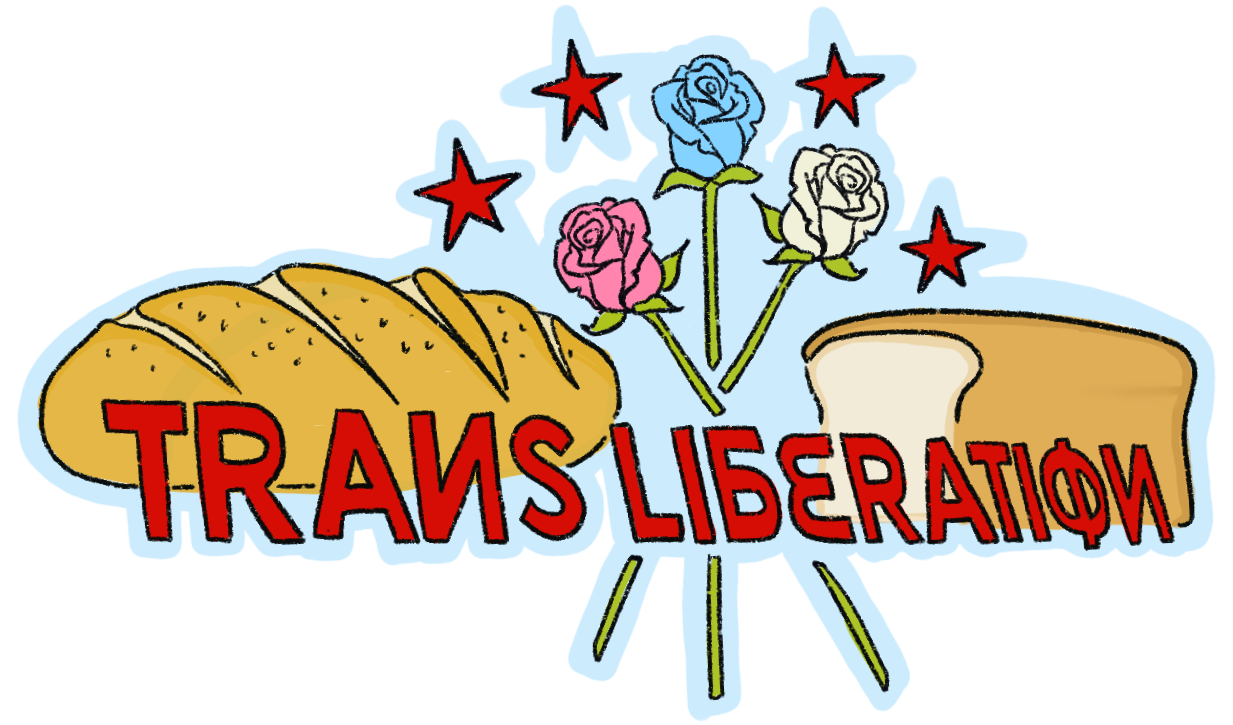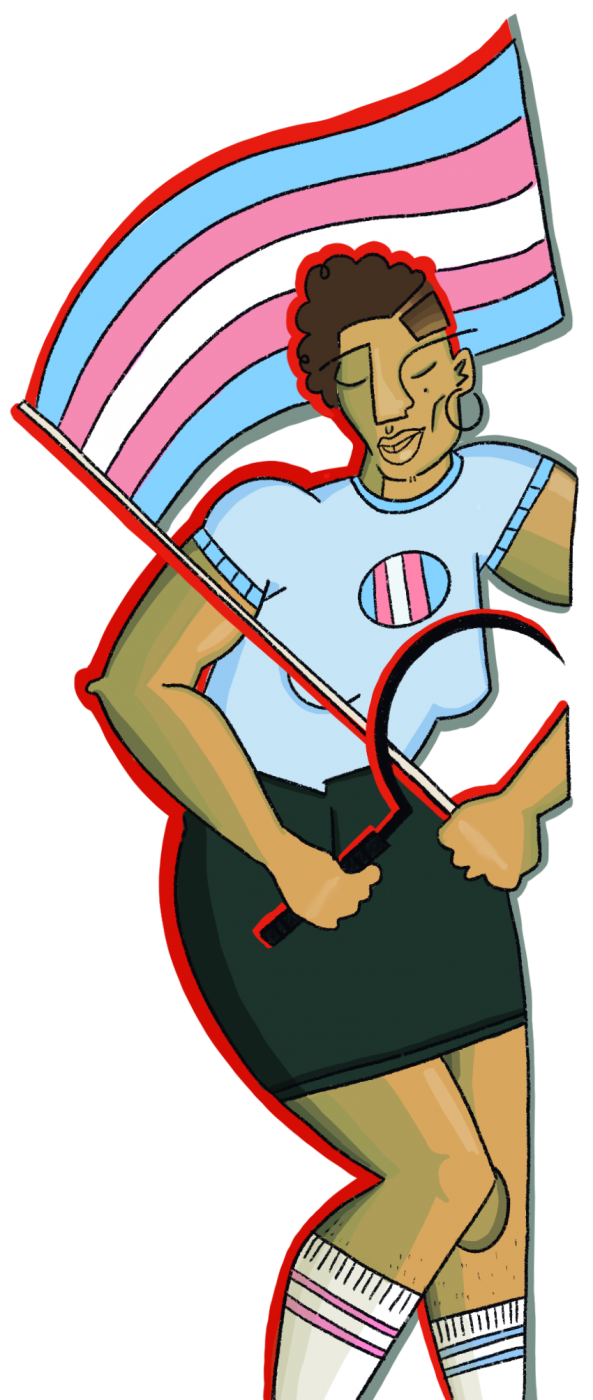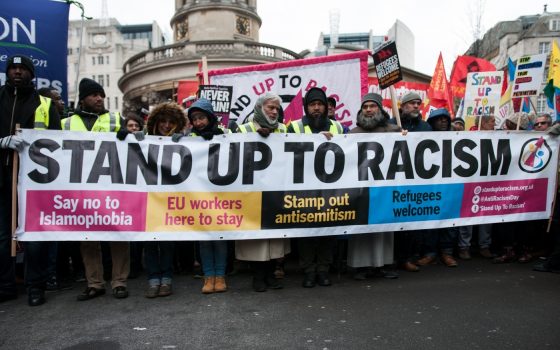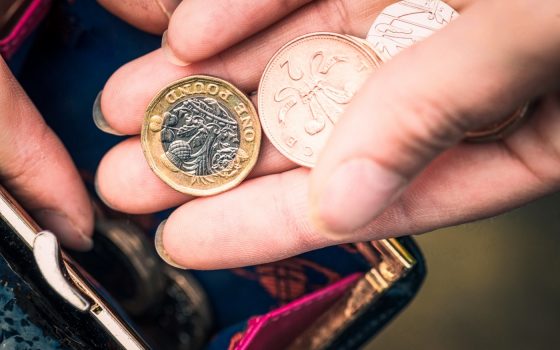Why trans liberation is a class issue
Fergal O’Dwyer interviewed Nim Ralph about the dangers of ignoring the material conditions that shape trans people’s lives
05 August 2021
This is an article from the third issue of the New Economics Zine. You can read the full issue here. Illustrations by Tamara-Jade Kaz
When most people hear about trans rights, they hear about bathrooms, pronouns and confusing legislation like the Gender Recognition Act (GRA). But are these really the main issues impacting the lives of most trans people today?
Fergal O’Dwyer sat down with organiser and educator Nim Ralph to discuss the dangers of ignoring the material conditions that shape trans people’s lives, and why we should advance a vision of trans liberation which is rooted in class solidarity.
FO’D: Hey Nim, to start us off could you unpack why we seem to spend so much time talking about bathrooms and pronouns — and how this can suit opponents of trans rights?
NR: Topics like these are often not part of an agenda set by trans people ourselves, but instead by the people who hate us. They are sites of transphobic rhetoric that play on non-trans (or cisgender/cis) people’s discomfort: for example the fear of ‘getting language wrong’, having to use ‘weird language’, self-ID (a trans person being legally understood as trans without jumping through bureaucratic hoops), trans people in sports, and trans women in bathrooms. All of these are designed to evoke feelings of unease and make abstract questions out of real people’s lives. Don’t get me wrong, toilets and pronouns are important, but the manufactured debates around them distract us from the structural ways that trans people are harmed — through things like homelessness, alienation from support structures, education, work and healthcare, and experiences of violence from partners, families, the state and strangers.
These constructed debates then feed the ‘social-mediafication’ of allyship. Support for trans people is seen as easy-to-reach-for soundbites and acts of well-meaning but often performative allyship. Responses like this are defined by the cultural agenda set by transphobes, instead of solidarity that’s contextual to the day-to-day material needs of trans people.
So, why is trans liberation a class issue?
In a very simple sense, because struggles for trans liberation are the same as broader working-class struggles.
To give a few stark examples, half of transgender people in the UK are unemployed, with one in three employers saying that they wouldn’t hire a transgender person according to one report. One in four trans people have experienced direct discrimination in healthcare. Lesbian, Gay, Bisexual and Trans + (LGBT+) young people make up at least 24% of the youth homeless population. 16% of trans women experienced domestic violence in 2018 compared to 7.5% of women more broadly.
Some of this is explained by the unique oppression that trans people face (and, of course, trans people’s experience of these issues can vary wildly based on gender, race, work, disability and other things). But clearly trans people are impacted by the same structures that oppress the working class. We should be arguing for solidarity within the working class across our differences, and that includes trans people.

Yes, and of course it’s also a class issue in the sense that capitalism has shaped our understanding of gender. It’s a very big question but I wonder if you can give us a couple of examples to help us understand this.
There’s so much to cover here! It’s certainly true that gender was used by European colonisers as a means of social classification and control in the projects of colonisation and industrial labour.
As capitalism was developing in northern Europe from the end of the 18th century, industrial production of goods like iron and textiles required parts of the workforce to do the labour and parts of the workforce to provide care for those labourers and children who would grow up to become labourers. Masculinity and femininity were built into the economy as a binary, with one half of the workforce (women) conditioned to undertake unpaid care and domestic work for the other half (men) tasked with labour and production. It wasn’t ‘natural’ that the economy was broken down by gender — it was designed that way. The division of labour by sex/gender defined our social relations — so it’s not that gender determined our roles in the workforce, but rather that our roles in the workforce defined and formed our gender. By not fitting into these categories, trans people disrupted these gendered social relations. The capitalist class therefore deemed us unfit, often leading to institutionalisation. This gave few choices beyond staying closeted, hidden, without work or working in the informal economy.
Outside northern Europe, it was a different story. In the so-called ‘civilising projects’ of the colonies, colonisers enforced racial categories (the idea that the white colonisers were superior to the colonised people) and a gender binary (the idea that there are only two genders: men and women) onto people in order to control populations and reproduction. Gender and race were bound together to create hierarchies of racial groups organised from superiority to inferiority (with white people on top). When colonisers encountered societies with systems of gender beyond the binary it was used as a demonstration of their ‘racial inferiority’ and justification for their subjugation. But racialised groups were also ‘given’ genders to justify this subjugation. For example, Black people were depicted by colonialists as hyper-masculine, and South Asian people as feminine. (This is hard to unpack in a short interview and these processes are nuanced – for more information check out our Further Reading section at the end of the interview).
This history helps us to understand how capitalism colluded with imperialism, patriarchy and sexism, as well as white supremacy, to decide what it means to be trans.
I want to go back to something you said about acts of allyship. I think there are plenty of trans allies now who will think of trans liberation in terms of winning legislative change for trans people (like reforming the GRA) or better representation (like more trans MPs or CEOs). What are the limits to this vision of trans liberation?
So we have two frameworks here. One is concerned with trans rights, and the other with trans liberation. Trans rights identifies the cause of trans people’s subjugation as a lack of civil and legal rights which prevents us from gaining power and representation in the existing system. Trans liberation identifies the cause of trans people’s subjugation as inherent to the very system itself: we are not experiencing transphobia because the system is broken, we are experiencing transphobia because the system is working as it was designed.
If we understand that capitalism enforces gender, race, sexuality and disability onto our bodies then representation in that system cannot free us. The idea that we can challenge transphobia by gaining more power and representation within the system is a fallacy because the system is the very thing that maintains oppression.
That’s not to say that engaging in these sites of conflict can’t be meaningful. I myself have campaigned on GRA reform despite being oriented towards a more expansive framework of trans liberation. It’s possible to concern ourselves with rights and stay true to a liberationary project (albeit never easy!) — but only if we critically reflect on how this helps us long term, rather than as an endpoint in and of itself.
So coming back to your question: I think allyship is to representation politics as solidarity is to liberation politics. Allyship ends up passive and preoccupied with ‘privilege’ — whereas solidarity recognises our shared class status and works across differences to build interdependence in our struggles. We need more solidarity and less allyship in my opinion.

I wonder if it might be helpful to provide a bit of context as to how the tensions between trans rights and trans liberation are playing out in the real world?
Absolutely: as I mentioned, the endgame of the trans rights agenda is often representation and inclusion in existing structures. For example, recently MI6 flew a trans flag for the first time and many within the trans community celebrated this. This is a moment, to me, when the solidarity of shared experience is fractured by our visions for freedom. Who is in which camp is decided predominantly by our safety within and proximity to the British State. I don’t feel liberated by the idea of trans members of MI6 when it’s the secret intelligence service for the state to maintain its racist, imperialist border and economic policies.
We currently live under a government where a woman of Indian heritage is heading up one of the most aggressive assaults on migrants and asylum seekers the UK has known. The government just published a report denying the existence of systemic racism written by a Black man. In the US, Caitlyn Jenner has announced she’s running for governor of California as a Republican, parroting Trumpian views against homeless people and trans women in sports as part of her campaign. If we concern ourselves only with trans rights and representation, these count as wins because someone from an oppressed class has enough social acceptance or economic privilege to survive without needing to maintain class solidarity. But having a trans woman collude in the system that subjugates other trans people is never a win.
Don’t get me wrong, broader social acceptance is a good thing, but it is not the same thing as liberation. Inclusion can feel comforting to people who are historically, culturally, socially excluded from society — I always say ‘if you’re not at the table, you’re on the menu’. But we should also be concerned with dismantling the table.
Instrumental wins that look like trans rights but help us towards liberation are ones that take power away from the system, not add more power to it. So GRA reform would have been an example of a way trans people gained power to self-ID, and removed some power from the state to determine whether or not we are trans.
The theme of this zine is “what kind of world do we want to go back to”. What big changes would you like to see in the fight for trans liberation coming out of the pandemic?
As a whole I would like to see more structural analysis that leads to collective action for all of us. Throughout the pandemic we have seen the biggest one-year transfer of wealth in history: workers have lost $3.7tn while billionaires have made $3.9tn. We have seen our government handing contracts to friends and relatives for personal protective equipment and ventilators that never materialised, while they clapped on doorsteps every Thursday night. Even when our fights are different, the groups and people we are fighting are the same.
Although data on trans people is unreliable for lots of reasons, there are statistically very few ‘out’ trans people in the population. This makes it particularly challenging for us to find each other and organise. The unrelenting attacks on our rights and lives for the past few years have put many trans folks into survival mode, isolating us from each other even more. But this isn’t the only story. There are many trans organisers engaged in anti-poverty, anti-racist, housing, healthcare movements across the country. I’d love to see other parts of our movements proactively building relationships with trans folks and connecting our demands to theirs.
Where this happens best is when I see, for example, health workers learning about supporting trans people and community trans health initiatives outside of professional healthcare settings. Or feminist collectives actively reaching out to trans campaigns instead of waiting for us to tell them they haven’t thought about our needs. I am hopeful about the galvanisation of our movements throughout the pandemic and think the more bridges we build between our struggles, the better equipped we will be to win.
Nim Ralph is an activist and educator. They organise extensively around issues related to trans liberation, abolition, anti-racism, disability and the environment. You can find more of their work on Twitter: @NMRLPH
Images: Tamara-Jade Kaz and the Gender Spectrum Collection
Topics Inequality






